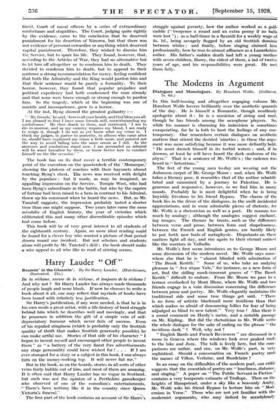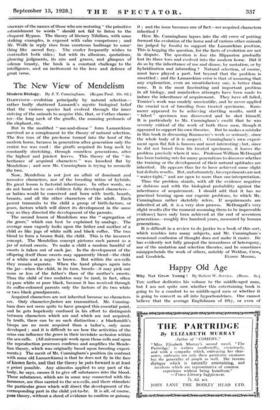The Moderns in Argument
IN this half-teasing and altogether engaging volume Mr. Humbert Wolfe hovers brilliantly over the aesthetic quarrels of the day. He is himself a Romantic, though needlessly apologetic about it : he is a musician of string and reed, though he has friends among the saxophone players. So, while his manner is charming his indecision is sometimes exasperating, for he is loth to hurt the feelings of any con- temporary. One . remembers , certain dialogues on aesthetic matters that stirred the derided 'nineties ; in these the argu- ment was more satisfying because it was more defiantly held. " He must drench himself in its turbid waters ; and, if he drowns, at least he will have heard the dark seahorns of the abyss." That is a sentence of Mr. Wolfe's ; the cadence was heard in " Intentions."
The feet of the young men to-day are wearing out the Aubusson carpet of Mr. George Moore ; and, when Mr. Wolfe takes a literary pose, it resembles that of the author rehabili- tated and canonized by a journey to Palestine. He is generous and responsive, however, so we find him in many moods. Probably he is most delightful when he is being boyishly frivolous to his friend Bypass. The charm of the book lies in the decor of the dialogues, in the, swift incidental appreciations, and in some admirable pieces of rhetoric, for Mr. Wolfe is a rhetorician as well as a poet. He reasons too much by analogy ; although the analogies suggest enchant. ing images. The themes he treats, such as the difference between verse and prose, between form and shapelessness, between the French and English genius, are hardly likely to put forth new buds of metaphysic. Disputants on these matters fight all day, and rise again to their eternal contest like the warriors in Valhalla.
Mr. Wolfe's first scene introduces us to George Moore and some discussion of the modern novel. ' Mr. Wolfe says some- where else that he is " almost blinded with admiration of The Brook Kerith.' " Some of us, who take an undying pleasure in " Ave atque Vale," for instance, as a new form of art, find the sidling mock-innocent graces of " The Brook Kerith " difficult to endure. From Mr. Moore we pass to a terrace overlooked by Mont Blanc, where Mr. Wolfe and two friends engage in a vain discussion concerning the difference between prose and poetry. Mr. Wolfe elegantly maintains the traditional side and some true things get said. " There is no form of artistic blackmail more insidious than that which makes us afraid of denouncing follies for fear of being adjudged as blind to new talent." Very true ! Also there is a sound comment on Hardy's metre, and a notable passage on Mr. Kipling. But did the rhetorician in Mr. Wolfe write the whole dialogue for the sake of ending on the phrase " the invidious dark " ? Well, why not ?
" English Bards and French Reviewers " are discussed in a room in Geneva where the windows look over peaked roofs to the lake and Jura. The talk is lively here, but the com- parisons are unfair, and one, on Mr. Wolfe's part, is very sophistical. Should a conversation on French poetry omit the names of Villon, Verlaine, and Baudelaire ?
In an essay on the difficulties of the modern poet, our eritic suggests that the essentials of poetry are " loneliness, distance, and singing." A paper on " The Public Servant in Fiction" contains a very temperate estimate of Trollope. Then on the heights of Hampstead, under a sky like a heavenly Araby, Mr. Wolfe asks his friend Bypass to lecture him on " Mod- ernism in Verse." Those who are not yet familiar with the modernist' arguments, who may indeed be scandalously unaware of the names of those who are restoring " the primitive astonishment to words " should not rail to listen to the eloquent Bypass. The theory of literary Nihilism, with some striking examples, is exposed with calM competence ; and Mi. Wolfe in reply rises from 'coirteons badinage to some- thing like sacred fury. The reader frequently wishes to contradict both sides ; but with its allusions, quotations, glancing jtidgments, its airs and graces, and glimpses of solemn beauty, the book is a constant challenge to the intelligence, and an incitement to the love and defence of great verse.







































 Previous page
Previous page